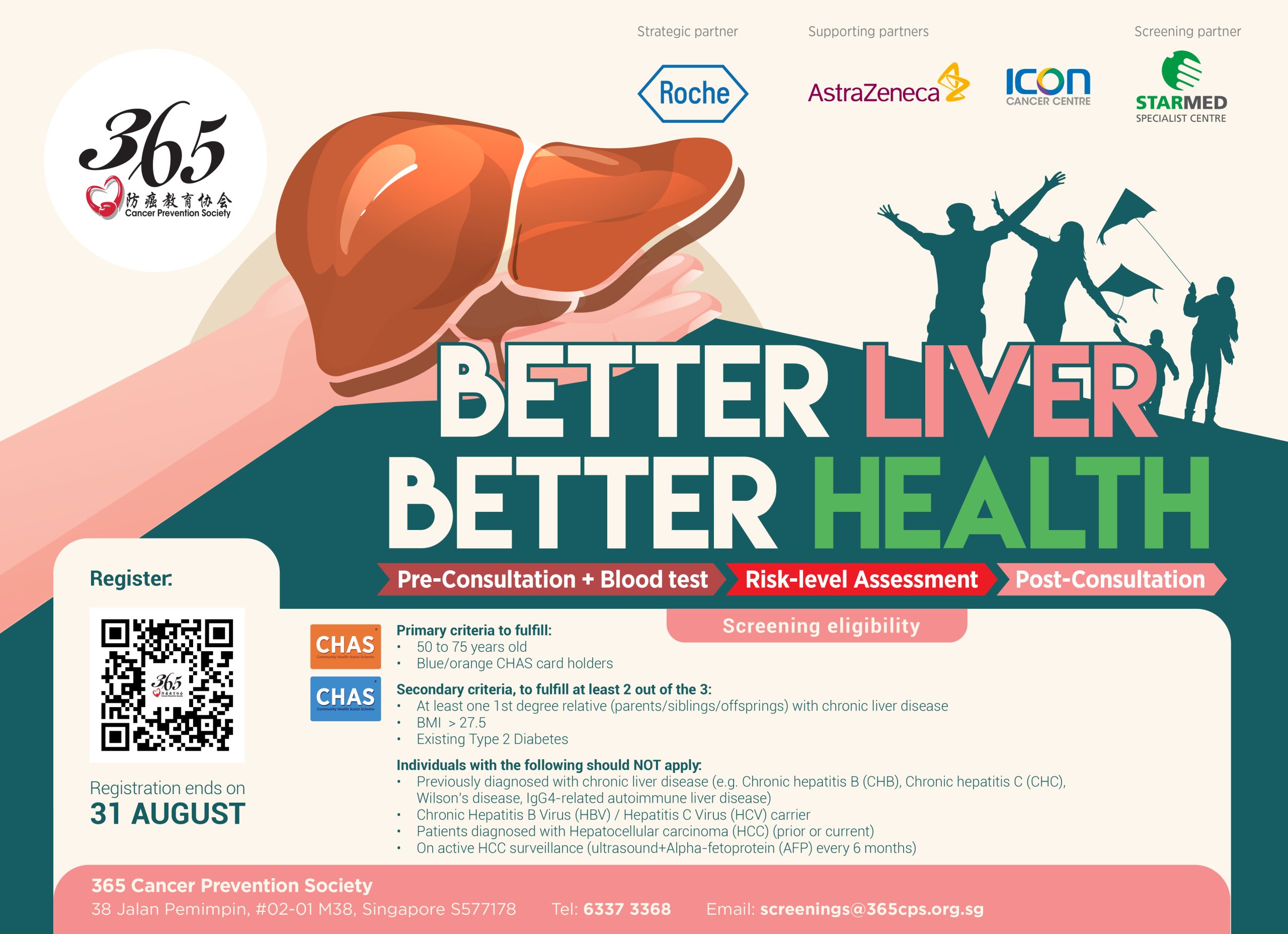Events

Fatty Liver Disease is a growing concern worldwide as well as in Singapore. It is known as the “Silent Killer” and can silently progress towards more serious conditions such as cirrhosis (scarring) and liver cancer. Liver cancer is the 5th most common cancer among males in Singapore. Although liver cancer is less common in females, it is still the third highest cause of deaths in both genders and this is because only 20% of primary liver cancers are diagnosed at an early stage. With early detection and prevention, fatty liver disease can be managed and liver cancer can be prevented.
Registration for the Better Liver, Better Health Fatty Liver Disease Screening is now closed.
Keep an eye out for the next campaign!
About Fatty Liver
Fatty liver disease is a common chronic liver disease where excess fat is deposited in the liver of people who drink little or no alcohol and can lead to liver cirrhosis (scarring) and liver cancer. The good news is, fatty liver disease can be reversible with the right lifestyle approach. However, if it is not managed properly, fatty liver disease can lead to more serious conditions such as cirrhosis (scarring) and liver cancer.
Steps to reverse a fatty liver:
- Weight loss
- Improve diet
- Regular exercise
Signs and Symptoms
Individuals with early fatty liver disease usually shows no symptoms. However, if symptoms are present, it may be non-specific symptoms that includes:
- Tiredness
- Nausea
- Bloating
- Loss of appetite
- pain in the right upper abdomen
Late symptoms that relate to the complications of cirrhosis (scarring) can include nausea, jaundice, swollen abdomen and poor concentration.
Causes and Risk Factors
- Family History/Hypertension/Hyperlipidemia (High Cholesterol)
- Obesity
- Hepatitis B Carrier
- Hepatitis C Carrier
- Metabolic Conditions/Diabetic patients
How To Prevent Fatty Liver Disease?
- Healthy weight loss
- Well-balanced diet
- Regular exercise
- Control of diabetes, hypertension, obesity, cholesterol
- Avoid alcohol and smoking
How is Liver Disease Linked with Liver Cancer?
Only 20% of primary liver cancers, Hepatocellular Carcinoma (HCC) are diagnosed at an early stage. HCC develops in patients with chronic liver disease. Around 80-90% of HCC was developed in cirrhotic livers and 15% of HCC was developed without prior cirrhosis. There are various causes of HCC in Southeast Asia:
- 31% of HCC is due to Alcoholic Liver Disease (ALD)
- 26% of HCC is due to Hepatitis B infection
- 22% of HCC is due to Hepatitis C infection
- 21% of HCC is due to other causes e.g., Non-Alcoholic Fatty Liver Disease (NAFLD), aflatoxin

Screening Process
Step 1 – Register with 365CPS
Click on the “Register” button at the bottom of this page, complete and submit the online registration form.
Upon submission, our staff will respond to you in 5 working days.
Eligible individuals will receive a Confirmation Letter endorsed by 365CPS.
Step 2 – Schedule an Appointment
Once you receive the Confirmation Letter endorsed by 365CPS, kindly contact the selected clinic directly to schedule an appointment.
Kindly bring along your NRIC and Confirmation Letter for your appointment.
Step 3 – Consultation and Blood Test
The appointment will involve a blood test to assess your liver health and a consultation with a doctor.
Step 4 – Review
A risk-level assessment will be done based on the test results. Should your results indicate a higher risk for liver disease, a referral letter will be issued to refer you to a public health setting for further investigations.
